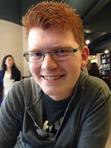Books, Books, Books
Anecdotally, one of the hardest parts of adjusting to college has been figuring out how best to manage my time. I've written at length about how being away from parents means that you have to discover new habits. To a large extent, you can decide what sort of person you are -- you have a lot more free time, and it's up to you to decide how that gets used.
When I'm at home, I often stay up much later than my parents, sitting at the kitchen table with my laptop. My life has made the transatlantic shift -- most of my friends and all of my work are based in GMT-5 now. E-mail and Facebook are the connections to my life now. Being at home is relaxing and enjoyable, but it definitely feels like I'm stepping away from my everyday life. Sitting in the kitchen with my laptop is my way of staying connected to the rest of my life, now that my parents aren't a physical presence everyday. I enjoy the catch-up time, when nobody else is awake and there are no distractions -- nothing to bend to but my own will.
In the same way, college is a time when you can exercise your will a lot more. Not only to you have more time, but your entire schedule changes. I'm a morning person, so I organized my classes as such and have evenings off. (I don't know if I have a matutinal personality or if it's more correct to say that my joints fare better in the mornings -- in the evenings, I want to walk less and lie down more. My joints have been worse recently, possibly due to the change in the seasons. Cold weather really hinders my ability to get around, so I'm hoping to get around more now that the temperatures are in the sixties.)
One of the most important things for me coming to college was that I was going to read more. I tried and failed to read a book a fortnight in high school, but mostly fell down. Given that my concentration has improved since coming to college, I decided at the start of this year to read 60 books, or roughly a book every six days. Here's what I've read recently:
Night, by Elie Wiesel.
Read this mostly because it's short and its reputation precedes it. Good, and very important given that it's first-person, but not something that'll change your life.
Dragnet Nation, by Julie Angwin.
The latest in a long line of non-fiction I've been reading recently about surveillance and national security. Quite good at summing up the infosec landscape of the last decade. Only veers into the hippie today's-world-is-too-connected-world-not-having-a-cellphone-is-a-blessing in one chapter.
House Of Cards, by Michael Dobbs
Very British, very Machiavellian, very good light read.
Frankenstein, by Mary Shelley
I read this one for college, and it was hard to read it without the lecture baggage of Shelley writing a modern take on the Promethean myth and posing questions about human versus divine creation. Read this in two sittings and enjoyed very much.
V for Vendetta, by Alan Moore
Read for its connections to the cypherpunk movement. Offers an interesting take, but isn't something anti-surveillance wonks should take as their call-to-arms. Melodramatic and overblown, which makes it a bad manual but a fine story. Neither the US nor the UK have gotten to the stage of V For Vendetta's Britain, so the real-life debate needs to be a lot more moderate.
If I was to recommend one of these to you, I'd recommend House of Cards for fiction and Dragnet Nation for a non-fiction read. HOC is quick and enjoyable, and DN is a good introduction if you've heard a lot about surveillance in the news and want to know more about it.



